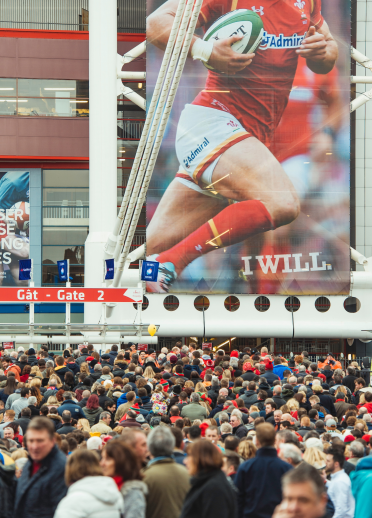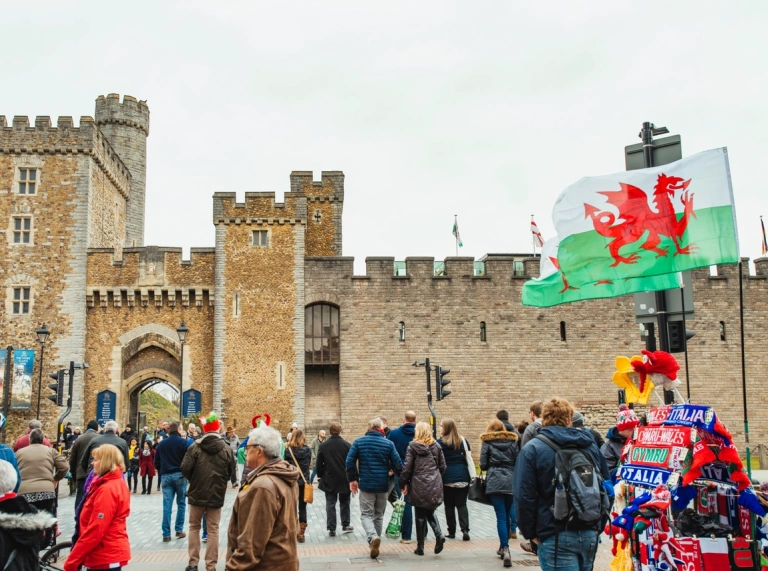In Wales, there are two clear signs that spring is on the way: daffodils coming into bloom, and the opening game of the Six Nations Championship. Starting on the first weekend in February, it’s not only Europe’s greatest rugby spectacle, but a sporting gala that occupies a unique place in Welsh culture.
Rugby union has long been considered Wales’ national sport. It’s a game we took to our hearts at the end of the 19th century, and we’ve never let it go. (Only in recent years has rugby’s supremacy been challenged, thanks to the stellar performance of Wales’ football team on the international stage – that’s a debate for another time!)
Over two months, the Six Nations Championship sees Wales square up to the national rugby teams of England, Ireland, Scotland, France and Italy (in total, these are the 'six nations' of the tournament). While other host cities dispatch fans to outer suburbs for their games, our Principality Stadium is right in the heart of Cardiff. Match days in Cardiff are a carnival that takes over the town centre, with thousands turning out in the Wales team’s scarlet jersey.
The men’s tournament has traditionally captured most of the attention, but that’s changing. The Women’s Six Nations Championship follows hot on its heels, with home games played at Cardiff Arms Park, next door to the Principality Stadium. There’s also an Under-20s Six Nations, where you can pick out the rugby stars of tomorrow.


How the Six Nations tournament works
The championship is played out over five weekends, with each team playing every other team once. There’s a weekend off in the middle, for players (and spectators) to get a well-earned rest. Matches take place on Saturdays and Sundays until the final round, when all three of the remaining games are decided on “Super Saturday”.
In even-numbered years, Wales play three of their five matches at home. These are always the ones against France, Italy and Scotland – easy to remember, as they’re the three teams that play in blue. In odd-numbered years, Wales have just two home games in Cardiff, hosting England and Ireland.
It’s not just the winning that counts. Since 2017, the Six Nations uses a “bonus point” scoring system to reward feisty play on the field. Teams get no points for a loss, two for a draw and four for a win. But on top of that, a losing side will earn one bonus point if they come within seven points of the winner’s score. An additional point goes to any team scoring four or more tries in a game.
There’s an extra three-point bonus for bagging the Grand Slam by winning every match – the ultimate achievement for a Six Nations team. And though it doesn’t affect the competition’s outcome, you’ll hear about the Triple Crown, which is awarded to any Home Nation (Wales, England, Scotland or Ireland) that beats all the other three.
When the points are totted up at the tournament’s end, there’s one accolade no one wants. The team in last place is said to have won the Wooden Spoon – emphatically not to be confused with a Welsh lovespoon. It’s a fate that has befallen a Welsh Six Nations team only once, in 2003.
The oldest international rugby contest in the world
The history of the Six Nations stretches back more than 140 years. Its direct ancestor was the Home Nations Championship, inaugurated on 16 December 1883 when Wales took on England at Swansea (and lost).
The tournament became the Five Nations Championship when France joined in 1910. Its format would stay more or less the same for the rest of the century, interrupted by two world wars – plus a spell in the 1930s when the French were thrown out for using professional players in what was then a strictly amateur game. Italy came on board in 2000, kicking off the modern era.
Though a lot younger, the Women’s Six Nations Championship has followed a similar evolution. First contested in 1996 as the Home Nations, it became the Five Nations in 1999 and swelled to its current size in 2002.
Over the years, the fortunes of our national team have ebbed and flowed. Welsh people of a certain age will go misty-eyed at the mention of the 1970s, when players such as Gareth Edwards, JPR Williams and Barry John helped make Wales all but unbeatable. A wilderness period followed, but the men in red stormed back in 2005 to win the first of four Six Nations Grand Slams – a tally matched only by France. All told, Wales has won the modern tournament six times, putting us joint second behind England in all-time rankings.


Countdown to kick-off
The atmosphere in Cardiff on a match day is something special. The roads around the Principality Stadium are closed to traffic, and turn into a river of eager fans as kick-off approaches. It’s good news for street traders and local bars: you won’t need to look far if you want to buy a rugby scarf or daffodil hat, have your face stencilled with a red dragon, or get a quick drink or bite to eat before the game.
Inside the stadium, home and away fans of all ages sit together. There’s a musical build-up, often with massed choirs and a military band, until the players run out to the pitch to a fiery blast from the stadium’s flamethrowers. Few sporting moments come close to the surge of pride and anticipation when the national anthem, Hen Wlad fy Nhadau, reverberates around the stands.
The music doesn’t stop there. Whatever the fortunes of the Welsh team on the day, few would disagree that our fans are the best at driving the players forward with song. The classic repertoire includes the Welsh hymns Calon Lân and Cwm Rhondda, the folk song Sosban Fach and Max Boyce’s rugby anthem Hymns and Arias – punctuated by the occasional fanfare from the mariachi band.
If you’re keen to experience a Six Nations match in Cardiff for yourself, it’s vital to plan ahead. Tickets are available from the Welsh Rugby Union, and it’s worth looking over the Principality Stadium website to make sure your visit goes smoothly.
Accommodation is booked up well in advance: see the Visit Wales directory for ideas.
On match day, special queueing systems are in place at the rail station, with plenty of marshals around to help you find the right connections. The park-and-ride facilities are a good bet if you’re staying outside Cardiff and driving in.
It’s also a good idea to reserve a place if you’re heading for the city centre’s most popular bars or restaurants. Whatever the result, it’s guaranteed that the party will be going on well into the early hours!





